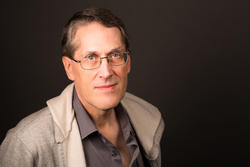

Fraser A. Duncan (1962-2017)
On February 4th 2017, SNOLAB, Queen’s University, and Canada lost a dedicated colleague, leader, mentor, and physicist. Born in 1962, Fraser Duncan graduated from schools in Mission, BC, then went on to study Engineering Physics at UBC, in the Electrical Engineering option. After working on the construction of TRIUMF’s Secord Arm magnetic SPectrometer (SASP), Fraser went on to a Ph.D. at UBC studying non-resonant pion production with proton beams on neutrons using a liquid deuterium target. He then went to the University of Maryland for a postdoctoral position based at Thomas Jefferson National Laboratory where he worked on parity-violating electron scattering as a probe of nucleon structure.
Fraser started his career in underground physics joining the Queen’s University Subatomic Physics group in 1997 to work on the SNO experiment. Fraser quickly took leadership of the calibration sources and hardware development at Queen’s, and coordinated much of the calibration efforts across the experiment. He developed the mechanically complex manipulator system that provided deployment and hoisting of sources within the SNO detector acrylic vessel with three-axis motion and precision relocation. The prototypes were systematically tested from a garden shed cantilevered over the edge of the roof of the physics building. His ability to get things built and working came from his attention to details, and skill in design, mechanical assembly, electronics, and the software and controls. Fraser was also meticulous in his documentation of hardware, drawings, procedures and plans. Fraser then became Detector Manager for SNO in 2001, coordinating and managing detector operations, directing run time schedules and optimization, calibrations, maintenance and emergencies, and seeing the detector through the critical salt-addition phase and installation of the 3H neutral-current detectors. He wrote the original software package for SNO to perform the neutrino physics analysis, and performed the first global solar neutrino oscillation analysis. From 2004 he was appointed deputy SNO Director, a roll he filled to the end of the SNO experiment, responsible for the day-to-day operations and maintenance of the underground site.
Fraser’s experience in underground operations took him to the role of Associate Director SNOLAB in 2004, a responsibility he held concurrently with management of the SNO facility. A sharp scientist with broad engineering experience, Fraser was immersed in every design detail of the SNOLAB facility. Much of SNOLAB came to be, because Fraser had the insight, from air handlers, ducting design, chiller systems, piping, firewalls, electrical distributions, cable-trays, compressed air, rail lines, showers and laundry – Fraser thought through everything. Participating in all experiment reviews, Fraser was the gatekeeper for underground installations, ensuring his high standards for science merit, proper engineering, installation planning, project management, quality control, and above all safety. Fraser loved to tour visitors; and while he joked about it being like herding cats, he was always a warm host, inspiring and educating, while proudly showing off the laboratory and the experiments, and delighting in the stories and details as to why thing were. He was also an avid photographer, an much of the SNOLAB image documentation and catalogue is due to his effort.
Of course besides all his accomplishments, it’s the person we remember most. Unassuming in his casual grey sweatshirt uniform, with his dry sense of humour, he was a firm leader, absolutely professional, yet also a greatly empathetic and kind manager. He lead by example, and felt particular responsibility for students, whether watching over them in the lab, detailed reading of their work, driving them to SNOLAB, or bringing gas to a stranded car in the middle of the night. Yet Fraser was always a very private person, and few knew he was a pilot, loved jazz, Celtic, and new age music, had a sweet tooth for chocolate, and was very fond of single malt scotch.
With tremendous insight, Fraser had his hand in everything at SNOLAB, and we miss him greatly.
Awards
Recipient of the 2015 Breakthrough Prize in Fundamental Physics as a member of the SNO collaboration.